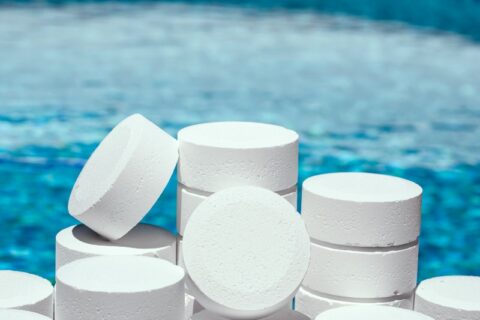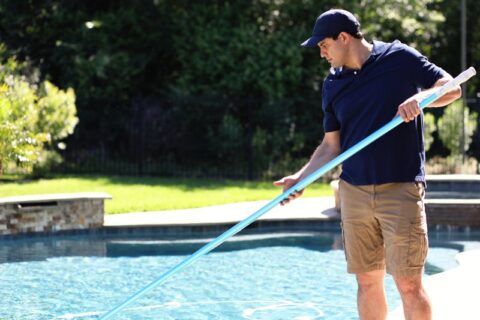Residential Inground Pool Liner Maintenance
There are many reasons people choose vinyl lined pools over fiberglass or concrete. Cost effective, low maintenance, and smooth to the touch, they come in a wide range of design options and can be installed quickly. They can cost more in the long run than fiberglass pools, though, because the vinyl pool liner will eventually need to be replaced. Fortunately, with the right swimming pool maintenance, you can help your liner to last for up to double the estimated lifespan of ten years.
- Don’t put anything in the pool that wasn’t made for a vinyl-lined pool. This means no letting the kids bring non-pool toys in, and no shoes or street clothes. Make sure, too, that you only clean the pool with tools designed to be used with a vinyl liner. Using tools and items that were not meant to be used in the pool can tear the liner and dramatically shorten its lifespan.
- Keep your pool water balanced. It may surprise you to learn that the pH of your pool can have a major impact on your pool liner. The pool pH should be between 7.2 and 7.6, which is slightly on the basic side of neutral. If the pH is low, or too far to the acidic side, the vinyl liner can actually begin to pucker and wrinkle. This is because acidic pH is corrosive to pool liners. On the other hand, if your pool’s pH is too high, above 7.8, it can cause scaling, in which calcium clouds the water and causes deposits on the liner. Because levels can shift from day to day due to sunlight, dirt, and even swimmers’ bodies, test your pool water regularly, either by using a kit or by hiring a professional to test it.
- Mind the chlorine. Chlorine is a harsh chemical, and it can badly bleach a liner, causing it to deteriorate. If you’re using chlorine or doing a shock treatment, dissolve your chemicals in a bucket first and then add them to the pool. Don’t use floating chlorinators with a vinyl pool liner, and don’t place chlorine tablets in the skimmer basket. Keep your chlorine levels below 2.0 ppm, preferably around 1.5 ppm, to kill germs without harming your liner.
- Care for the waterline. It’s easy for the sun to damage the part of your pool that’s above the water, and for dirt and grime to build up along the waterline. To prevent damage, wash the water line area frequently with a cleaner that’s specifically made to help vinyl pools stand up to the sun’s rays. You can also use enzymes to consume excess oils in your pool and keep a scum line from forming around the pool.
- Don’t ever drain the pool. Some people think they can more effectively clean their vinyl pool liners by draining their pools, but this is a major mistake. When a vinyl pool is emptied of water, the lack of pressure can cause the liner to shrink and crack, and it doesn’t take very long for this to happen. What’s more, draining the pool may void your liner’s warranty. Always leave at least a foot of water in the bottom of the shallow end of the pool to prevent damage to your liner.
Having a well-maintained pool adds value to your house, and when you need someone to care for your pool, Millennium Pools and Spas can help. With over 30 combined years of experience in the pool industry, we provide a comprehensive range of pool services for both residential and commercial customers in Virginia, Washington DC, and Maryland. When you hire Millennium Pools and Spas, you get a well-qualified, industry-trained staff of pool contractors and technicians, services that are tailored to your needs, and a commitment to 100% customer satisfaction. Contact us for more information.


